Dietary Needs of Rabbits: A Comprehensive Guide
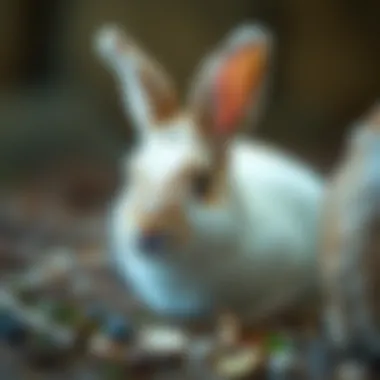
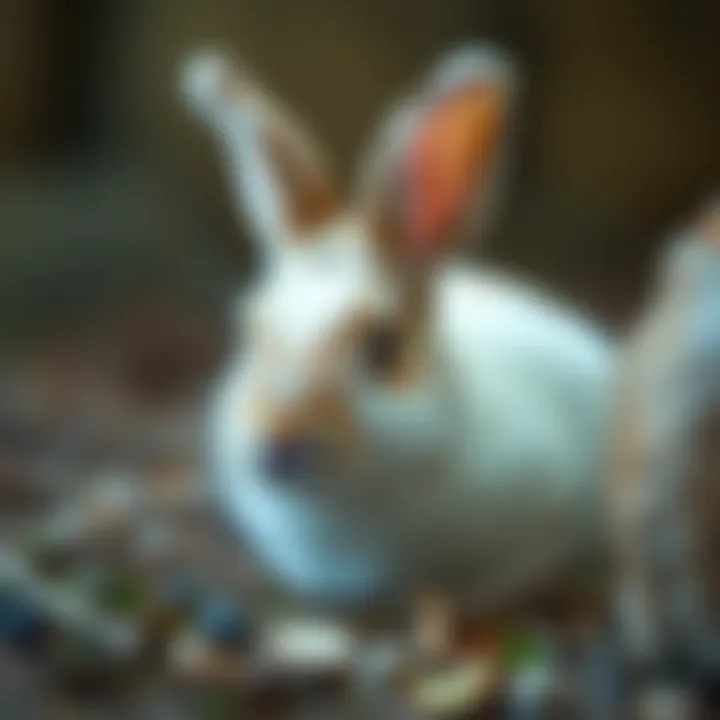
Intro
Rabbits are often seen as simple pets, but their dietary needs are anything but basic. Understanding what these furry companions prefer to munch on is essential for any pet owner aiming to keep their rabbit healthy and happy. This article dives into the intricate details of rabbit diets, addressing what foods to give, how to maintain a balanced nutrition, and the significance of fiber in their meals. With rabbits being notorious for their picky eating habits, knowing their preferences can transform feeding time into a rewarding experience. Supporting your rabbit's health isn't just about food; it's about understanding their behavior, their needs, and the link between what they eat and how they feel.
Understanding Your Pet
Pet Behavior Basics
Before you can grasp dietary preferences, it's vital to comprehend the intricate nature of rabbit behavior. Rabbits are crepuscular animals, meaning they are most active during dawn and dusk. Their instincts drive them toward foraging, and this behavior influences their eating patterns. Watch how your rabbit interacts with different foods, as this can reveal their favorites and dislikes. If they nibble enthusiastically, they might be onto something tasty! Conversely, if they turn their nose up at certain items, it's a clear sign that those don't tickle their fancy.
Common Breed Characteristics
Different breeds of rabbits exhibit distinct characteristics, which often extend to their eating habits. For instance, small breeds such as Holland Lops tend to be more selective with their food, while larger breeds like Flemish Giants are generally less fussy. Therefore, researching your rabbit's specific breed can provide insights into their dietary likes and dislikes, helping you make informed choices when shopping for snacks.
Species-Specific Needs
Not all rabbits share the same dietary requirements. Their needs can vary based on age, size, and overall health. Baby rabbits require a higher protein intake than adults, while seniors might need softer food that’s easier to chew. Understanding these nuances is crucial for feeding and maintaining your rabbit's wellness. Make sure to consult with a vet to tailor a diet that fits your rabbit's unique parameters.
Pet Care and Maintenance
Feeding Guidelines
Creating a feeding routine around a rabbit's dietary preferences is key. Here are some foundational feeding guidelines to consider:
- Hay: As the cornerstone of their diet, hay should be available at all times. Timothy hay is a favorite due to its high fiber content.
- Fresh Vegetables: Leafy greens like kale, romaine lettuce, and cilantro can contribute essential nutrients. Introduce these slowly, observing your rabbit’s response.
- Commercial Pellets: Look for high-quality pellets specifically designed for rabbits to provide balanced nutrition.
- Treats Sparingly: While fruits and treats like carrots or apples are enticing, they should be given in moderation.
Grooming Essentials
Rabbits require grooming to keep their fur in top shape and to avoid potential health issues. Regular brushing helps remove loose hair and reduces the risk of hairballs. Different breeds may have different grooming needs; for instance, long-haired breeds like Angoras could require daily grooming compared to short-haired types. Grooming also serves as a bonding activity that can help alleviate stress.
Hygiene Practices
Maintaining a clean living environment is just as essential for dietary health. Regularly cleaning the litter box, food dishes, and bedding keeps rabbits healthy and can minimize the spread of disease. A clean space not only promotes good hygiene but also encourages better feeding habits. An unkempt area may deter them from eating or exploring their food options.
Health and Wellness
Routine Vet Check-ups
Regular visits to the veterinarian can help catch potential issues before they escalate. Your vet can monitor your rabbit's weight and overall health, guiding you on adjusting diet if needed. It’s advisable to keep a look out for changes in eating behavior, as that can signal underlying health problems.
Vaccination Needs
Keeping your rabbit up-to-date on vaccinations is critical. Diseases like Rabbit Hemorrhagic Disease Virus (RHDV) can pose serious threats. Understanding vaccination schedules through discussions with your vet is part of a comprehensive care plan.
Recognizing Signs of Illness
Being attuned to your rabbit’s behavior can aid in identifying health issues early. Signs such as a decrease in appetite, lethargy, or any change in their droppings warrant immediate veterinary attention. The connection between diet and health is significant, so it’s important to intervene at the first signs of trouble.
Enrichment and Activities
Indoor vs. Outdoor Activities
Rabbits do best in environments that offer plenty of opportunities for exploration and exercise. Indoor rabbits can benefit from space to hop around and safe areas to explore, while outdoor rabbits can enjoy fresh air, although they should always be supervised.
Interactive Toys and Games
Keep your rabbit entertained to stimulate their behavior. Toys made from natural materials, such as willow or untreated wood, can be both engaging and good for their chewing needs.
Socialization Opportunities
Rabbits are social creatures; thus, they thrive on interaction. Whether it’s bonding time with their human or other rabbits, socialization plays a crucial role in their overall happiness and well-being.
"Understanding what our furry friends like to eat is pivotal in enhancing their quality of life and maintaining their health."
This article aims to deepen your knowledge about rabbits, ensuring that their dietary preferences are not only understood but celebrated. When you grasp these elements, you set the stage for a thriving rabbit that’s healthy and well-adjusted.
Intro to Rabbit Nutrition
Understanding what fuels a rabbit’s body is crucial for both its health and happiness. A well-balanced diet is not just about filling a bowl with food; it's a fine line between providing sustenance and ensuring optimal nutrition. This section sets the stage for comprehending the significance of rabbit nutrition, looking at the different facets that come into play when choosing the right foods for these furry creatures.
The Importance of a Proper Diet
A proper diet for a rabbit is the cornerstone of good health. Rabbits possess unique digestive systems that require specific nutrients to function well. Without the right diet, they can face a multitude of health issues ranging from dental problems to gastrointestinal disorders.
- Fiber is critical: Unlike many pets, rabbits thrive on a high-fiber diet. Fiber not only aids digestion but also keeps their teeth from overgrowing. Hay should comprise the bulk of their diet, serving as their primary source of fiber.
- Nutrient variety matters: Just as we benefit from a diverse diet, rabbits require a range of nutrients to maintain their health. Fresh greens, vegetables, and occasional fruits offer essential vitamins and minerals while promoting hydration.
- Behavioral implications: The type of food also affects a rabbit's behavior. A poorly balanced diet may lead to lethargy or even behavioral issues such as aggression or boredom. Keeping meal times interesting helps stimulate their minds, promoting happier pets.
“A rabbit's well-being is intrinsically linked to its diet—understanding their needs is paramount for every pet owner.”
Furthermore, considering their taste preferences and individual dietary needs can enhance not just their nutrition but also the bond between pet and owner. By paying attention to what suits their palate, owners can encourage healthy eating habits, making it easier to manage weight and overall health.
In this article, we will dig deeper into the various aspects of rabbit nutrition that impact their diet. From the significance of hay types to the nutritional value of specific vegetables and treats, we’ll cover a comprehensive guide that aims to illuminate the path toward understanding what your pet rabbit truly needs for a long and healthy life.


Types of Food Rabbits Prefer
When it comes to rabbit care, understanding the types of food that these animals favor is vital for their overall health and happiness. Not only does a rabbit's diet greatly influence its physical well-being, but it also plays a significant role in its behavior and emotional state. Providing the right types of food helps in nurturing a rabbit's natural instincts and can prevent health issues down the line. The right balance of hay, fresh vegetables, fruits, and commercial pellets can make all the difference in your pet's life.
Hay: The Staple of a Rabbit's Diet
Hay forms the foundation of a rabbit's nutritional plan, acting like bread and butter. Timothy hay, for instance, is a popular choice among rabbit enthusiasts. It’s tough and fibrous, promoting good dental health as rabbits chew through it. Hay provides essential roughage, aids in digestion, and helps prevent obesity, a common concern in domesticated bunnies.
Moreover, the act of foraging can relieve boredom. Tufts of hay can cause rabbits to kick up their heels in sheer joy, not to mention the fact that its texture encourages them to nibble and nibble, keeping their teeth in tip-top shape. Choosing high-quality hay that’s free from mold ensures that your bunny gets all the nutrients they need.
Fresh Vegetables: Variety is Key
Next up on the menu is fresh vegetables. It’s often said that variety is the spice of life, and rabbits are no exception. Introducing a rainbow of leafy greens not only captivates a rabbit's palate but also provides a spectrum of vitamins and minerals. Romaine lettuce, kale, and cilantro are delightful staples that can keep your furry friend energized.
However, it’s crucial to avoid overloading with starchy vegetables. While carrots may be the poster child for rabbit food, too many can lead to weight gain. Instead, you can experiment with different greens and see which ones your rabbit enjoys most, making each meal a mini feast for both the taste buds and health.
Fruits: Occasional Treats
Fruits are like dessert for rabbits, and they should be offered sparingly. These sugary joys can entice even the pickiest of eaters. Treats such as apples, bananas, and strawberries can be given as rewards or just to show affection. But moderation is key. A slice here and there, rather than making fruits a regular part of the diet, keeps your rabbit healthy and avoids digestive upset.
Always remember: A little sweetness goes a long way.
Commercial Rabbit Pellets
Now, let’s not forget about commercial rabbit pellets. Essentially a mix of hay, grains, and various nutrients, these pellets can fill the nutritional gaps that other foods might leave behind. However, not all pellets are created equal. High-quality options are typically high in fiber and low in protein to mimic a rabbit's natural intake.
Look for brands that do not contain fillers or added sugars. It’s also wise to check the ingredient list for grass hay at the top, which ensures that your rabbit is getting the right balance of nutrients. Remaining consistent about portion control will help maintain your rabbit’s ideal weight and stave off potential health issues.
Understanding Fiber Requirements
A proper understanding of fiber requirements is essential when it comes to the dietary habits of rabbits. Unlike many other pets, rabbits possess a unique digestive system tailored for processing fiber-rich foods. This distinct digestive mechanism is not only vital for their well-being but also prevents various health issues that can arise from a low-fiber diet.
The Role of Fiber in Digestive Health
Fiber serves several significant roles in maintaining a rabbit's digestive health. It is important to recognize that rabbits have continuously growing teeth, which requires them to constantly chew. Ingesting fiber-rich foods helps to wear down their teeth naturally, thereby preventing dental problems that could lead to more severe health issues down the line.
Besides dental health, fiber is crucial for the digestive process itself. A sufficient intake of fiber facilitates the movement of food through the gastrointestinal tract. When rabbits consume hay and fresh vegetables, the fiber stimulates gut motility, ensuring that food passes through efficiently. This is essential, as a sluggish digestive system can lead to serious conditions like gastrointestinal stasis, which can be life-threatening if left unaddressed.
Furthermore, fiber plays a vital role in promoting a healthy cecum. The cecum is a part of a rabbit's digestive system that ferments food, allowing for the absorption of necessary nutrients. High-fiber foods encourage the growth of beneficial bacteria in the cecum, aiding in nutrient breakdown and overall digestive health.
While rabbits may have their preferences when it comes to taste, any rabbit owner must ensure that their pet receives a diet consistently rich in fiber. Offering a mix of hays—such as Timothy or Orchard Grass—should be the cornerstone of a rabbit's diet, complemented by a variety of fresh vegetables.
"A fiber-rich diet is not merely beneficial; it's essential for a rabbit's health and longevity."
Hay Varieties Suitable for Rabbits
Hay is a cornerstone of any rabbit's diet, serving as a source of essential nutrients and fiber that contribute to overall health. When it comes to selecting the right type of hay, it is crucial to understand the different varieties available and how each can benefit your furry companion.
Rabbits naturally graze on grass, and hay mimics this natural foraging behavior. This is not just a dietary necessity; it also promotes mental stimulation and helps prevent boredom in domestic rabbits.
A well-balanced diet encompasses various hay options, each offering unique features and benefits. Choosing the right hay can enhance your rabbit’s digestive system, dental health, and quality of life. Let’s delve into three primary hay varieties suitable for rabbits: Timothy hay, Orchard grass, and Alfalfa hay.
Timothy Hay
Timothy hay is often considered the gold standard for rabbit nutrition, providing a balanced ratio of fiber, protein, and calcium. It's made from dried grass that matures into a robust, leafy plant, ensuring a rich source of forage.
- Benefits:
- High in fiber, which is crucial for maintaining a healthy digestive system.
- Supports dental health by naturally wearing down the teeth as rabbits chew.
- It's generally lower in calories compared to other hay varieties, reducing the risk of obesity in rabbits.
Timothy hay is available in various cuts—first, second, and third. The first cut is coarse and stemmy, rich in fiber but lower in nutritional value. The second cut, which is softer and leafier, is often more preferred by rabbits. However, it may contain slightly more protein, making it a bit richer on the nutrient scale. The third cut is the softest and has the highest calorie content, so moderation is advised.
Orchard Grass
Orchard grass offers a delightful change of pace, with a sweeter aroma that can entice even the pickiest eaters. This hay is soft and leafy, making it easy for rabbits to chew and digest.
- Benefits:
- Contains higher levels of protein and moisture, which can be particularly beneficial for young or nursing rabbits.
- The soft texture is gentle on the mouth, making it an excellent choice for older rabbits or those with dental issues.
- It is also higher in digestible fiber, helping to keep the digestive tract flowing smoothly.
Orchard grass can be a fantastic addition to the diet, especially when combined with other hay types. Its sweetness may encourage rabbits to try it, ensuring they get a varied diet that consists of more than just one type of forage.
Alfalfa Hay
Alfalfa hay is often recommended primarily for baby rabbits or pregnant/nursing mothers due to its high calcium and protein content. However, it should not form the basis of an adult rabbit’s diet.
- Benefits:
- Rich in proteins and vitamins that support growth and development, making it ideal for young rabbits.
- Contains a higher calcium level, which can support bone growth in young rabbits, but may lead to health issues in adults if fed in excess—like urinary problems due to high calcium levels.
- Its palatable nature often makes it a favorite among rabbits, encouraging them to eat more and enjoy their meals.
However, while Alfalfa may be a treat in moderation, it should not replace fiber-rich hay like Timothy or Orchard grass, which is essential for adult rabbits.
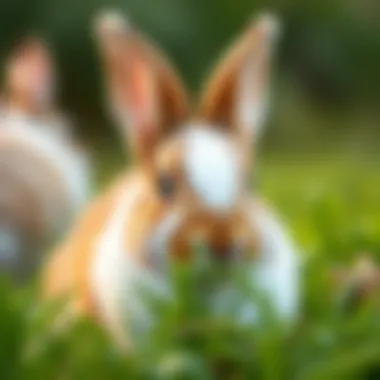
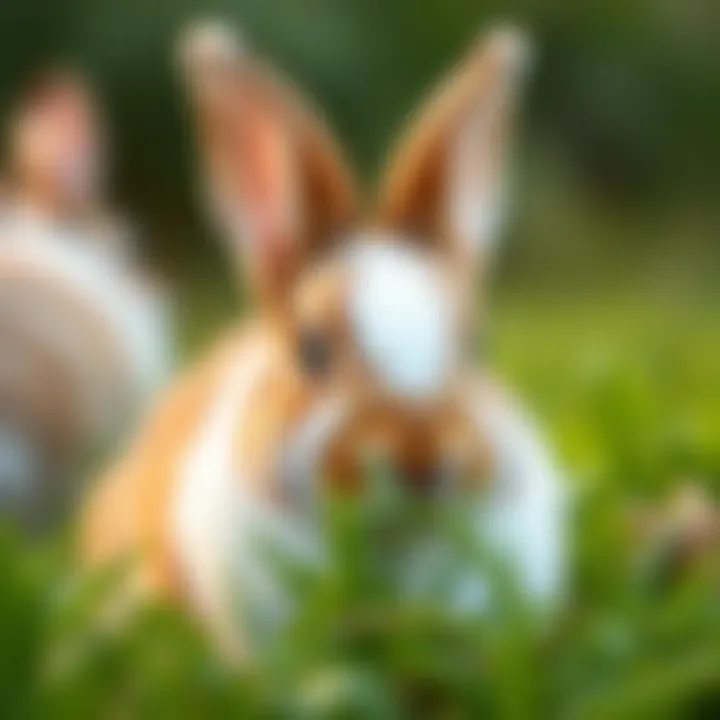
"A balanced diet incorporating various hay types can significantly impact a rabbit's health and happiness."
Essential Vegetables for Rabbits
When it comes to a rabbit's diet, vegetables play a crucial role beyond just being an addition to their meals. They provide essential nutrients, promote digestion, and offer a delightful variety that can keep your furry friend engaged and satisfied. A diverse range of vegetables supports a rabbit's overall health and well-being, making it vital for pet owners to understand which vegetables are most beneficial.
Leafy Greens
Leafy greens are the backbone of a rabbit's vegetable intake. Packed with vitamins and minerals, they help cater to a rabbit's nutritional needs perfectly. Not only are these greens rich in fiber, but they also help in maintaining hydration due to their high water content. Common choices include romaine lettuce, kale, and cilantro.
However, not all leafy greens are equal—some can be harmful or should be fed sparingly, such as iceberg lettuce, which offers little nutritional benefit and can lead to digestive issues. When introducing leafy greens to a rabbit’s diet, it is essential to do so gradually, watching for any adverse reactions.
Certain greens offer specific health benefits. For instance:
- Romaine Lettuce: It's fiber-rich and helps maintain digestive health.
- Kale: High in calcium, it supports bone health but should be provided in moderation due to its oxalic acid content.
- Cilantro: Known to be a favorite among rabbits, it's an excellent source of antioxidants.
Notably, adding variety keeps meals interesting for rabbits, encouraging them to eat more. Fresh greens provide an enriching experience, allowing them to nibble and munch in a natural way.
Root Vegetables
Root vegetables might not be the first type of food that comes to mind for rabbits, but they can play a supportive role in their diet when fed in moderation. Unlike leafy greens, root vegetables are usually higher in sugar and starch, making them a less preferable choice. However, offering small amounts can still be beneficial and enjoyable.
When selecting root vegetables, commonly recommended options include carrots and radishes. Carrots are often thought of as a sweet treat; however, they should be viewed as an occasional snack rather than a main food source due to their high sugar levels. In moderation, carrots can help enrich your rabbit's diet, keeping it balanced without overwhelming them with sugars.
Radishes or parsnips can be excellent alternatives to carrots due to their lower sugar content. These can introduce new flavors and textures, which is particularly advantageous for keeping your rabbit stimulated and happy. Just remember to introduce these root vegetables slowly, so as not to shock their digestive systems.
Fruits That Are Safe for Rabbits
Fruits are often seen as a delightful treat for rabbits, providing not just flavor but also vital nutrients. Understanding which fruits are safe can help in crafting a well-rounded diet that keeps your furry friend healthy and satisfied. While these little creatures thrive primarily on hay and leafy greens, fruits can offer additional variety and enrichment. Healthy treats can promote good mouth health and provide hydration due to their high water content. However, moderation is crucial, as too much sugar from fruits can lead to digestive issues.
Common Fruits and Their Nutritional Value
There’s a veritable cornucopia of fruits that rabbits can enjoy. Here’s a look at several commonly offered fruits along with their nutritional benefits:
- Apple (with seeds removed)
Apples are rich in fiber and vitamin C, which helps maintain healthy skin and fur. However, the sugar content does mean they should only be given in small amounts. - Banana
Bananas are a source of potassium and magnesium. They also contain a fair bit of sugar; hence, they should be treated as an occasional snack rather than a staple. - Blueberries
These tiny wonders are antioxidant powerhouses. They're low in calories and high in vitamins A and C, making them a perfect, healthy choice in small quantities. - Strawberries
Strawberries provide fiber and rich antioxidants. They are flavorful and visually appealing to rabbits, adding a bit of excitement during mealtime. - Grapes (seedless only)
While grapes are a tasty snack, they are sweet and should be given sparingly to avoid tummy troubles. - Pineapple (in moderation)
This tropical delight is rich in bromelain, which can aid digestion. Just the fresh core should be offered, and only in small bites.
Always ensure to wash fruits thoroughly to remove pesticides before offering them to your rabbit.
It’s important to observe how your rabbit reacts to new fruits. Each rabbit may have its own palate, and while one may gobble up grapes, another might turn its nose up. Pay attention and adjust their treat options accordingly. Integrating safe fruits into your rabbit’s diet can create a more enjoyable feeding experience, but remember, it's the balance that matters most!
Dangers of Inappropriate Foods
A rabbit's diet is not just about what it eats, but also about what it shouldn't. Understanding the dangers of inappropriate foods is crucial for any rabbit owner. This knowledge helps in maintaining a healthy lifestyle for rabbits and prevents various health issues that could arise from an unsuitable diet. It’s essential to ensure that foods are safe, as many common human foods can be harmful or even life-threatening to these delicate creatures.
Toxic Plants and Foods
Not everything that seems leafy and green is safe for a rabbit’s consumption. Some common plants and foods can turn into a ticking time bomb for your furry friend. For instance, lilies, while beautiful, are notorious for being toxic. Just a nibble can cause serious kidney failure in most animals, including rabbits. Around the house, avocado should be avoided rigorously. The persin present in avocados can be dangerous. Ask any seasoned rabbit parent, and they’ll tell you that even though the rabbit may look at these items with curiosity, it’s best to keep them far from chewing distance.
Besides plants, several foods commonly found in pantries are not suitable. While iceberg lettuce might seem harmless, it offers little nutritional value and can cause digestive problems. Furthermore, chocolate is downright lethal; containing theobromine, it poses a significant risk. Even a small piece can lead to serious health challenges, so it's critical to keep all chocolate goodies under lock and key, away from those playful little paws.
What to Remember:
- Lily: Extremely toxic - can lead to kidney failure.
- Avocado: Contains persin, dangerous for rabbits.
- Iceberg lettuce: Nutritionally poor, can lead to diarrhea.
- Chocolate: Contains theobromine, a real poison.
Foods to Avoid: A Comprehensive List
When considering your rabbit's diet, it's vital to steer clear of certain foods. Making a list of items that should never find their way into their feeding bowls could save you from heartache.
- Dairy Products: Rabbits are lactose intolerant. Dairy can lead to severe gastrointestinal upset.
- Onions and Garlic: Known to cause anemia in rabbits.
- Rhubarb: This common garden plant is toxic and can cause severe organ dysfunction.
- Cabbage and other cruciferous vegetables: These can cause gas and bloat, which are detrimental to rabbits.
- Processed Foods: Items high in sugar, salt, or fats like chips or cakes are a no-go.
- Nuts and Seeds: Their high-fat content can be simply too much for a rabbit's digestive system.
Perfectly nourishing diets need to also incorporate the knowledge of what is harmful. By explicitly keeping these foods out of reach, rabbit owners can foster a safe and healthy eating environment for their beloved pets.
For more insights, consider checking trusted resources like Wikipedia or PetMD.
Understanding the Rabbit's Taste Preferences
Understanding a rabbit's taste preferences is essential for providing a diet that not only supports their health but also keeps them content. Rabbits, like humans, have individual likes and dislikes when it comes to food, and acknowledging these idiosyncrasies can greatly enhance their eating experience. Each rabbit is unique, and their varied preferences can depend on factors like age, breed, and previous exposure to different foods.
Supporting a rabbit’s personal tastes contributes to a more enjoyable feeding routine, minimizes the chances of uneaten food going to waste, and ultimately leads to a healthier, happier pet. By exploring these preferences, pet owners can make smarter choices in terms of providing a balanced diet that meets the nutritional requirements while also enticing their furry friends. Whether they gravitate towards green leafy vegetables or show a penchant for particular fruits, understanding these nuances facilitates a more harmonious relationship between pet and owner.
Individual Variations in Preferences
When it comes to food, no two rabbits are created equal. Some might eagerly munch on crunchy carrots, while others may outright refuse them. It’s important to recognize that a rabbit's taste preferences can be influenced by various factors:
- Age: Young rabbits may be more adventurous in their food choices, while older ones often become picky due to changing taste receptors.
- Past Experiences: A rabbit that has had a bad experience with a particular food will likely avoid it in the future. For example, if a rabbit associated a specific veggie with discomfort, that food may be off the menu for good.
- Breed Traits: Different breeds can have distinct dietary inclinations. Some, for instance, might prefer the sweeter options, while others lean towards more fibrous fare.
"Rabbits have sophisticated palates, much like humans. They can learn to like or dislike certain tastes based on their experiences, creating a dynamic relationship with food."
- Environmental Factors: The setting in which a rabbit eats can also shape their preferences. If a rabbit is anxious or feel uncomfortable during feeding time, it might refuse to eat altogether.
Speaking of feeding experiences, involving your rabbit in the process can also lead to more robust dietary approval. Once you’ve determined what dietary options your bunny gravitates towards, it’s worthwhile to introduce new flavors gradually. Some rabbits enjoy a little excitement in their meals and may appreciate the occasional treat or change.

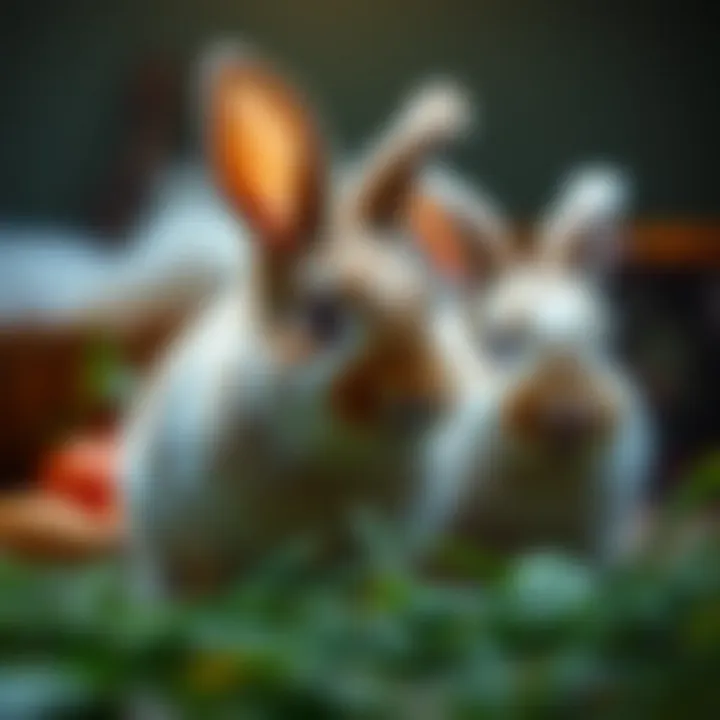
To cater to your rabbit’s specific preferences, here are some tips:
- Observe Feeding Habits: Take note of what your rabbit eats most enthusiastically and what they tend to nibble at half-heartedly.
- Experiment: Try varying their diet by introducing new vegetables or herbs but do so in small amounts to observe reactions.
- Diversity of Flavors: Incorporating a range of tastes will not only keep mealtimes interesting for your rabbit but also ensure they get the nutritional diversity they need.
In essence, understanding your rabbit's taste preferences opens up doors to more personalized and better eating habits, fostering a connection between diet, health, and happiness.
Behavioral Aspects of Rabbit Feeding
Understanding how rabbits interact with their food gives pet owners valuable insights into their overall well-being. Rabbit feeding habits are more than mere sustenance; they reflect their natural behaviors, preferences, and social dynamics. A rabbit's diet is a crucial factor that impacts not just its health, but also its emotional state and daily activities.
When observing how rabbits eat, you'll notice they have a variety of approaches depending on the food type and their current mood. Some rabbits are very discerning, while others may be less picky, often motivated by hunger or boredom. Their particular feeding habits can serve as a window into what they need emotionally and physically.
Moreover, establishing a clear feeding routine encourages comfort and predictability. This is akin to setting meal times for children; it not only enhances nutrition but also provides a sense of security.
Feeding Habits and Their Significance
Feeding habits can vary widely among rabbits, influenced by breed, age, and individual personality traits. Here are some key behaviors to keep an eye out for:
- Grazing: Rabbits are natural grazers. Having free access to hay or fresh greens throughout the day allows them to nibble whenever they feel like it, mimicking their behavior in the wild. This is not merely about eating; it's a way to keep stress levels low.
- Preferred Flavors: Rabbits may develop specific preferences for certain vegetables or hay types, which can impact their eating habits. Observing what they gravitate towards can inform better dietary choices that align with their taste.
- Social Feeding: When kept in groups, rabbits often engage in social feeding where they may follow one another's eating habits. This creates a communal experience that fosters bonding, reduces anxiety, and elevates their overall mood.
- Exploration and Interaction: When presented with a new food item, some rabbits may approach cautiously. This is part of their instinct to explore and is crucial in encouraging them to try new foods. It’s vital to introduce new options slowly and encourage exploration.
"Observing how a rabbit interacts with food not only helps in selecting the right diet but also enriches their lives, enhancing both their happiness and health."
In summary, understanding these behaviors is essential for tailoring a rabbit's diet to suit its preferences and needs. It helps owners to create an environment that nourishes both the body and the spirit of their furry companions. By focusing on these behavioral aspects, pet owners ensure that their rabbits thrive, leading to a happier and healthier life.
Monitoring and Adjusting a Rabbit's Diet
Monitoring and adjusting your rabbit's diet is crucial for ensuring their overall health and well-being. Our furry friends can be as particular about their food as they are loving, requiring a careful balance to thrive. Understanding how to observe their responses to dietary changes can make a significant difference in their happiness and health.
The process begins with consistent observation. Rabbits, being creatures of habit, usually display specific feeding patterns. Changes in these habits can serve as valuable indicators of health. For instance, if your rabbit suddenly refuses to eat their favorite hay, it could be a sign of dental issues or digestive discomfort. Making a note of these kinds of changes can help you catch potential problems before they escalate.
Benefits of Monitoring
- Early Detection of Health Issues: Regularly observing your rabbit’s eating habits can lead to quicker identification of health issues, such as obesity, gastrointestinal stasis, or dental problems.
- Adaptation to Nutritional Needs: Like people, rabbits' dietary needs can change as they age or if they're diagnosed with health problems. Monitoring allows you to adjust their diet to meet these evolving needs.
- Improved Diet Preferences: By paying attention to what your rabbit enjoys, you might discover new veggies or fruits they prefer, making mealtime a more enjoyable experience.
One essential element is maintaining a food diary. Tracking what your rabbit eats, how much, and when can provide insights into their dietary trends and needs. It helps in evaluating if your rabbit is receiving a balanced diet that meets their nutritional requirements.
Considerations When Adjusting a Diet
- Phase Changes Gradually: If you decide to introduce a new vegetable or treat, do it slowly to prevent digestive upset. Rabbits’ tummies can be sensitive, and a sudden change can lead to issues.
- Consult a Vet: If you're unsure about significant changes – say, if your rabbit is overweight or losing weight – don’t hesitate to seek professional advice. A veterinarian familiar with rabbit nutrition can guide you on the safest and most effective dietary adjustments.
"A rabbit’s diet shouldn’t be a shot in the dark; it’s about understanding their needs and what makes them feel good."
As you adjust your pet's diet, remain patient and observant. Monitor their behavior closely, taking notes on any changes, whether they be positive or negative. This due diligence will not only assure your rabbit’s well-being but also deepen the bond you share with them.
The Role of Fresh Water in Rabbit Nutrition
When it comes to the well-being of rabbits, fresh water often plays second fiddle to hay and vegetables in discussions about their diet. However, the crucial role of water in maintaining health cannot be overstated. Just like us, rabbits need a consistent supply of clean water to support their bodily functions.
Hydration Needs of Rabbits
Ensuring that your rabbit is properly hydrated is vital. A rabbit's body is mostly made up of water, and it directly affects everything from digestion to temperature regulation. Without proper hydration, rabbits can face a myriad of health problems, some of which can be serious.
A few key points to consider include:
- Fluid Balance: The right amount of water helps in maintaining fluid balance in the body, which is essential for various physiological functions.
- Digestive Health: Water supports the digestion of high-fiber diets. If a rabbit doesn't consume enough water, it can lead to blockages and digestive issues, a common problem for these furry friends.
- Temperature Regulation: On hot days, rabbits can become overheated, particularly if they are housed outdoors. Having fresh water available helps them to cool down.
- Urinary Health: Adequate hydration is crucial for urinary tract health. It helps to flush out toxins and can reduce the risks of urinary stones.
Important: Always ensure that your rabbit has access to fresh, clean water at all times. Consider using a heavy ceramic bowl or a water bottle designed for rabbits— some might tip over their bowls!
Tips for Ensuring Adequate Hydration:
- Check their water daily. Make sure it’s fresh and clean.
- Change the water frequently, especially if you notice any debris or contamination.
- Monitor your rabbit's drinking habits. If you notice a sudden drop in water intake, it could indicate a health issue that requires veterinary attention.
Seasonal Dietary Adjustments for Rabbits
Understanding how seasons influence the dietary habits of rabbits is crucial for their overall health and well-being. A rabbit's nutritional needs can change with the temperature and availability of natural vegetation. As pet owners, adapting their diets accordingly can ensure rabbits receive optimal nutrition throughout the year. This season-specific focus aids in preventing nutritional deficiencies and promotes a balanced diet that suits their needs as the environment shifts from one season to another.
How Seasons Affect Food Choices
The four seasons each come with their unique set of characteristics that influence the availability of food for rabbits. Here’s a closer look at how these changes occur:
- Spring: With the rebirth of plant life, rabbits can feast on a vibrant array of fresh greens and wild herbs. This season is a perfect time for increasing fresh vegetables and leafy greens, which are full of vitamins and minerals. The boost in natural forage can also encourage healthy foraging behavior in rabbits.
- Summer: As temperatures rise, rabbits may become more selective due to heat. They might prefer lighter, hydrating vegetables like cucumbers and leafy herbs. Keeping them hydrated becomes essential, so incorporating water-rich veggies or providing access to fresh water sources is a must.
- Autumn: This season often brings about the shedding of leaves and the harvest of various crops. Pet owners should consider incorporating root vegetables and high-fiber greens into the diet, tapping into what nature has to offer. However, ensuring that these foods are fresh and safe is crucial, as many plants can start to decay at this time of year.
- Winter: The cold months might limit access to fresh plants, prompting a shift towards hay and stored foods. Nutritionally rich treats, like certain dried herbs and safe commercial pellets, become crucial. Providing extra fiber through hay becomes essential to maintain digestive health and keep the rabbits warm.
It’s important to remember that rabbits are natural foragers, and their instinct to seek out seasonal offerings can lead to variations in their taste preferences.
Carefully observing your rabbit’s dietary preferences during each season can lead to better health outcomes. Transitioning gradually between food types can prevent digestive upset and help rabbits adjust to their changing diet. This tailored approach makes for an all-around happier and healthier pet, capable of adapting to nature’s whims.
Epilogue: A Balanced Approach to Rabbit Nutrition
In wrapping up our exploration of rabbit dietary preferences, it becomes clear that providing a well-rounded nutrition plan for our furry companions is not just beneficial but essential. A balanced approach to rabbit nutrition means focusing on a variety of foods that satisfy their natural instincts and improve their overall health. The art of crafting this diet involves more than just filling a bowl; it’s about creating a lifestyle that promotes vitality and happiness.
When considering the key elements of a rabbit's diet, it is paramount to prioritize high-quality hay, fresh vegetables, and a small amount of fruits and pellets. Each of these components plays a unique role:
- Hay: serves as the cornerstone of their diet and is critical for digestive health. It helps wear down their ever-growing teeth and promotes a healthy gut.
- Vegetables: provide essential vitamins and minerals while adding variety to their diet, which keeps them engaged and interested in their meals.
- Fruits and pellets: should be seen as occasional treats, rather than staples, to avoid any potential health issues like obesity or digestive upset.
Moreover, understanding the specific needs of your bunny can lead to improved well-being. Factors such as age, weight, and activity level can necessitate adjustments in their diet. Keeping a watchful eye on how your rabbit reacts to different foods can provide insights into their preferences and needs, ensuring that adjustments can be made where necessary
A balanced diet is not just about variety; it's about creating a harmonious nutritional landscape that your rabbit thrives on.
Consider also the psychological aspect of feeding. A rabbit that has a varied and interesting diet is often more stimulated, leading to better overall behavior. Just like us, rabbits can get bored with the same old meal every day. Introducing new veggies or even different types of hay can keep mealtime exciting.







